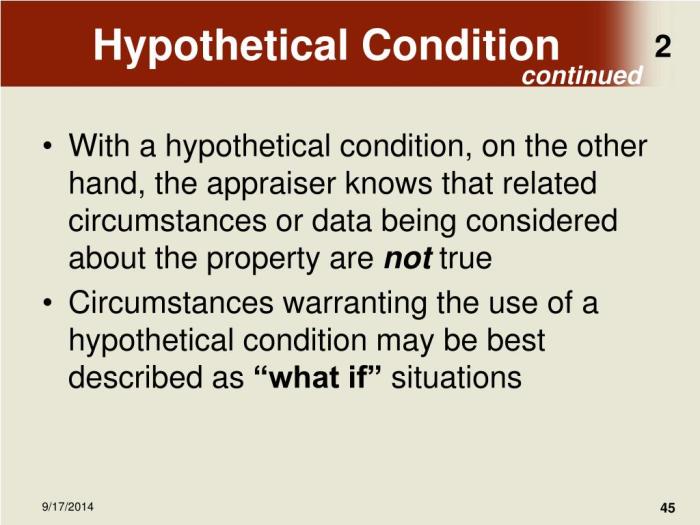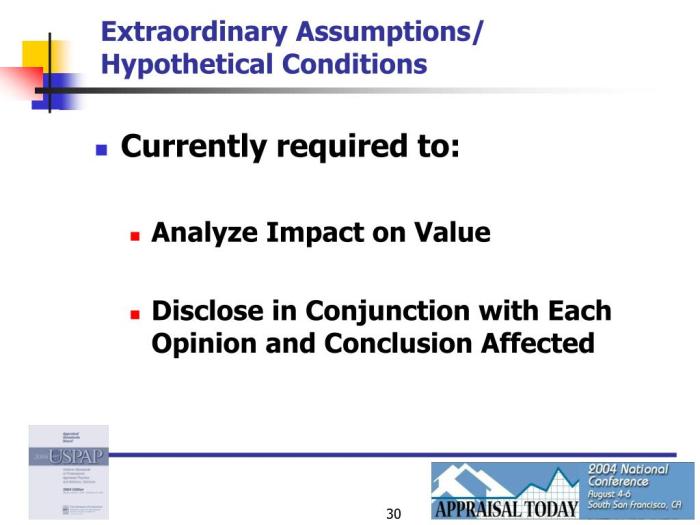Hypothetical condition vs extraordinary assumption – Hypothetical conditions and extraordinary assumptions are two distinct concepts that play a crucial role in decision-making and logical reasoning. While hypothetical conditions explore potential outcomes based on assumed scenarios, extraordinary assumptions involve accepting unproven or highly improbable propositions. Understanding the similarities and differences between these two concepts is essential for making informed decisions and engaging in rigorous analysis.
In this comprehensive guide, we will delve into the nature of hypothetical conditions and extraordinary assumptions, comparing their purposes, potential risks, and benefits. We will also examine real-world applications and the ethical implications of using these concepts.
Hypothetical Conditions

Hypothetical conditions are statements that describe a possible or imagined situation. They are used to explore the potential consequences of a particular action or event.
For example, you might say, “If I win the lottery, I would buy a new car.” This statement describes a possible situation (winning the lottery) and the potential consequence (buying a new car).
Hypothetical conditions can be used for a variety of purposes, including:
- Exploring the potential consequences of a particular action or event
- Making decisions about the future
- Understanding the cause-and-effect relationships between different events
Extraordinary Assumptions: Hypothetical Condition Vs Extraordinary Assumption

Extraordinary assumptions are assumptions that are not based on evidence or experience. They are often used to make decisions in the absence of complete information.
For example, you might make the extraordinary assumption that the stock market will continue to rise in the future. This assumption is not based on evidence, but it is necessary to make a decision about whether or not to invest in the stock market.
Extraordinary assumptions can be risky, but they can also be beneficial. If an extraordinary assumption turns out to be true, it can lead to a successful decision. However, if an extraordinary assumption turns out to be false, it can lead to a bad decision.
Comparison of Hypothetical Conditions and Extraordinary Assumptions

| Feature | Hypothetical Conditions | Extraordinary Assumptions |
|---|---|---|
| Definition | Statements that describe a possible or imagined situation | Assumptions that are not based on evidence or experience |
| Purpose | Exploring the potential consequences of a particular action or event | Making decisions in the absence of complete information |
| Risk | Low | High |
| Benefit | Can help to make better decisions | Can lead to successful decisions if they turn out to be true |
Hypothetical conditions and extraordinary assumptions are two different types of statements that can be used to make decisions. Hypothetical conditions are based on evidence or experience, while extraordinary assumptions are not. Hypothetical conditions are less risky than extraordinary assumptions, but they can also be less beneficial.
When making a decision, it is important to consider both hypothetical conditions and extraordinary assumptions. Hypothetical conditions can help you to understand the potential consequences of your actions, while extraordinary assumptions can help you to make decisions in the absence of complete information.
Real-World Applications
Hypothetical conditions and extraordinary assumptions are used in a variety of fields, including:
- Business:Hypothetical conditions can be used to explore the potential consequences of a new product launch, while extraordinary assumptions can be used to make decisions about investing in a new market.
- Finance:Hypothetical conditions can be used to explore the potential consequences of a change in interest rates, while extraordinary assumptions can be used to make decisions about investing in a particular stock.
- Government:Hypothetical conditions can be used to explore the potential consequences of a new law, while extraordinary assumptions can be used to make decisions about how to respond to a natural disaster.
When making decisions in any field, it is important to consider both hypothetical conditions and extraordinary assumptions. Hypothetical conditions can help you to understand the potential consequences of your actions, while extraordinary assumptions can help you to make decisions in the absence of complete information.
Question & Answer Hub
What is the primary purpose of using hypothetical conditions?
Hypothetical conditions allow us to explore potential outcomes and consequences of different scenarios without having to experience them directly. They help us make informed decisions and consider a wider range of possibilities.
How do extraordinary assumptions differ from hypothetical conditions?
Extraordinary assumptions involve accepting unproven or highly improbable propositions as true. While they can be useful for exploring extreme possibilities, they must be used with caution as they can lead to biased or unrealistic conclusions.
What are some potential risks of using extraordinary assumptions?
Extraordinary assumptions can lead to overconfidence in decision-making and a failure to consider more realistic alternatives. They can also create a false sense of certainty and limit our ability to adapt to changing circumstances.